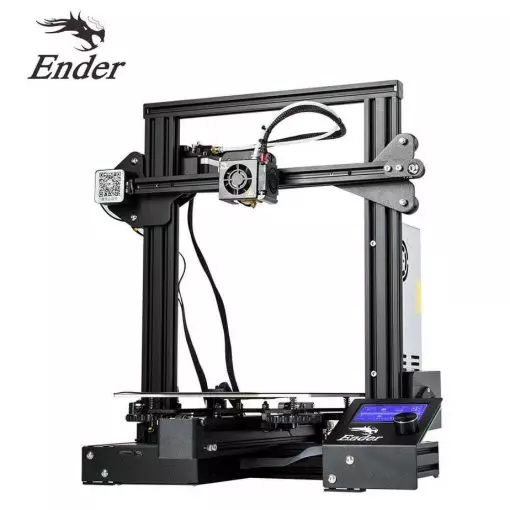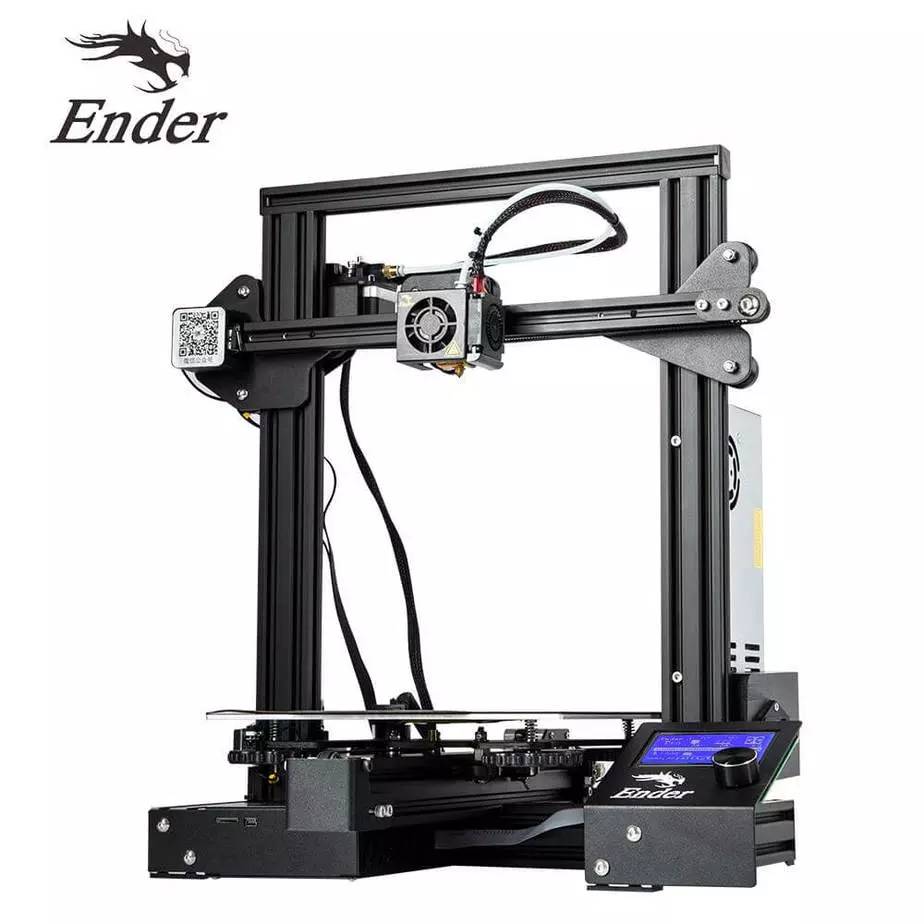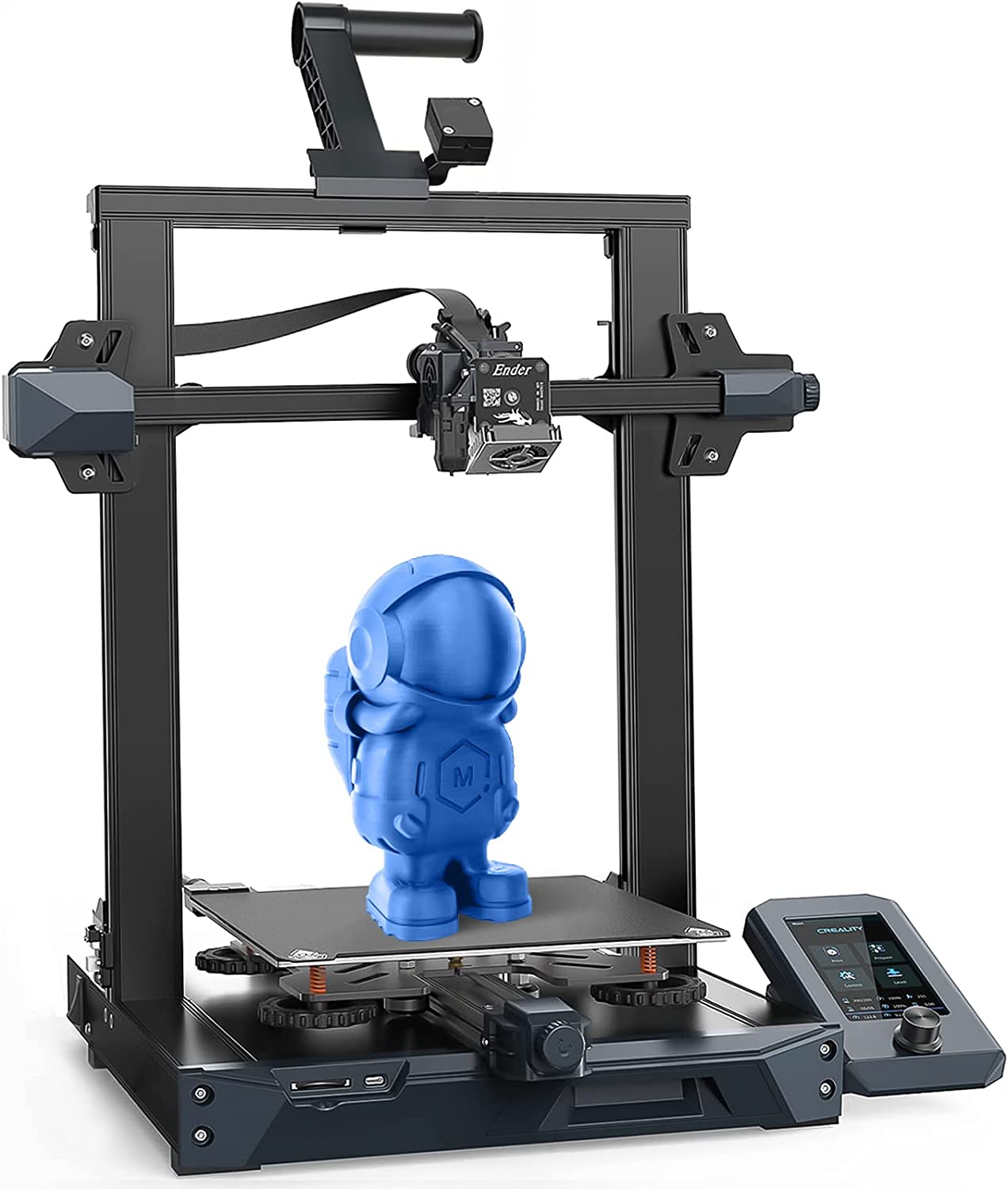Compare Ender 3 vs Ender 3 PRO vs Ender 3 S1
Comparison between the best 3D printers
Choose the best 3D printer at the best price. The cheapest 3D printers are here.
Buy a 3D printer here with 3D Fila.
 |
 |
 |
|
| Model | Ender 3[BUY Ender 3] |
Ender 3 PRO[BUY Ender 3 PRO] |
Ender 3 S1[BUY Ender 3 S1] |
| Printing Material | Filament | Filament | Filament |
| Estimated price | $210,00 | $258,00 | $399,00 |
| Fabricante | Creality 3D | Creality 3D | Creality 3D |
| Release Year | 2018 | 2019 | 2021 |
| Print Volume [mm] | 220x220x250 | 220x220x250 | 220x220x270 |
| Printer Size [mm] | 440x440x465 | 440x440x465 | 455x490x625 |
| Weight [kg] | 6,62 | 6,62 | 9,1 |
| Power Loss Recovery | NO | NO | YES |
| Enclosed printer | NO | NO | NO |
| Bed Leveling | Manual | Manual | Automatic |
| Filament End Sensor | NO | NO | YES |
| Bed type | Heated | Heated | Heated |
| Power supply system | Bowden | Bowden | Direct Drive |
| Standard nozzle | 0,4 | 0,4 | 0,4 |
| Maximum Nozzle Temperature [°C] | 255 | 255 | 260 |
| Maximum Bed Temperature [°C] | 110 | 110 | 100 |
| Maximum printing speed [mm/s] | 180 | 180 | 180 |
| Filament holder | YES | YES | YES |
| Camera for supervision | NO | NO | NO |
| Recommended filaments | PLA, TPU, ABS, PETG | PLA, TPU, ABS, PETG | PLA, TPU, PETG, ABS |
| Recommended slicers | Cura, Simplify, Slic3r | Cura, Simplify, Slic3r | Cura, Simplify, Slic3r, IdeaMaker, Creality Slicer e outros |
| Maximum Resolution [mm] | 0,1 | 0,1 | 0,05 |
| Processor | 8 bits | 32 bits | |
| Display | Mono | Mono | Display 4,3'' |
| Power Supply | 24V / 270W | 24V / 360W Meanwell | |
| Connectivity | SD / USB | SD / USB | SD / USB |
| Operating systems | Windows, Mac, Linux | Windows, Mac, Linux | Windows, Mac, Linux |
| Date of registration in the system | 2021-04-13 | 2021-04-14 | 2023-03-28 |
| Release date | 2018 | 2019 | 2021 |
| Extra features | The Ender 3 V1 is a DIY assembly 3D printer, a sales leader since 2017, standing out for its cost-benefit. With a wide printing capacity, it has a CNC machined structure for precision and stability. It offers high-precision prints with low noise, thanks to its innovative V-profile and pulleys. It has a self-adhesive magnetic platform for easy removal of models and excellent adhesion. The Ender 3 heats up quickly, reaching 100°C in 5 minutes, ideal for agile prints. It includes protection against power failures, allowing you to resume printing after interruptions, saving time and material. | The Ender 3 Pro stands out for its beginner-friendly assembly and easily modifiable structure. With a 350W power supply, it heats up quickly and has a simple application that offers good print quality. However, its motors and fans are noisy, and the interface seems outdated. Assembly is accessible, without the need for advanced techniques, and it has integrated belt tensioners. It includes a detailed guide and supports microSD card and USB. | The Creality Ender 3 S1 printer stands out for its easy assembly and quiet operation. It has automatic bed leveling and a direct drive system, providing high-quality prints. The design is sleek, with flat cables in mesh sleeves and a magnetic bed. The Creality Sprite extruder is lightweight and developed in-house, supporting a maximum nozzle temperature of 260 degrees. It includes a filament run-out sensor and power loss recovery, with a dual Z-axis for greater support and stability. The build plate is flexible steel with PC coating, and the printer supports a wide variety of filaments. |
| Support for multiple colors and materials (AMS and CFS) | NO | NO | NO |
Notes * |
|||
| Cost-benefit | 6 / 10 | 6 / 10 | 7 / 10 |
| Hardware | 0.5 / 10 | 0.5 / 10 | 2.4 / 10 |
| Screen | . | . | . |
| Print volume | 3 / 10 | 3 / 10 | 3 / 10 |
| Performance | 1 / 10 | 1 / 10 | 1 / 10 |
| [BUY Ender 3] | [BUY Ender 3 PRO] | [BUY Ender 3 S1] |
Conclusion |
| In comparing the Ender 3, Ender 3 Pro, and Ender 3 S1 3D printers, several key factors emerge that highlight their respective strengths and weaknesses. The **Ender 3** serves as an affordable entry point into the world of 3D printing. It has been a popular choice since its release due to its robust design and satisfactory print quality relative to its price. Ideal for hobbyists looking for a budget-friendly option, it lacks advanced features such as power loss recovery and an automatic bed leveling system, which may require additional manual intervention during setup. The **Ender 3 Pro** builds upon the foundation set by the Ender 3, offering slightly enhanced features including a stronger power supply and improved assembly ease. However, it carries some of the same limitations as its predecessor, such as manual bed leveling and relatively noisy operation. While it may not significantly outperform the Ender 3, it still offers a good balance of price and capabilities, making it suitable for those who appreciate a bit of extra quality and are willing to spend a bit more. The **Ender 3 S1** represents the latest advancement in this series, introducing features such as automatic bed leveling, power loss recovery, and a direct drive system. These enhancements translate into superior print reliability and quality, making it especially appealing to users interested in taking their 3D printing experience to a higher level. Despite its higher cost, the features it provides, along with its modern design and improved functionality, justify the investment for serious enthusiasts or those who require consistent and high-quality output. In conclusion, while all three models have their merits, the best choice largely depends on the user's experience level and budget. The Ender 3 is the choice for budget-conscious beginners, the Ender 3 Pro appeals to those wanting easier assembly with slight improvements, and the Ender 3 S1 stands out for those willing to invest in superior performance and features. As such, potential buyers should carefully consider their individual requirements and priorities when selecting among these three solid 3D printers. |

